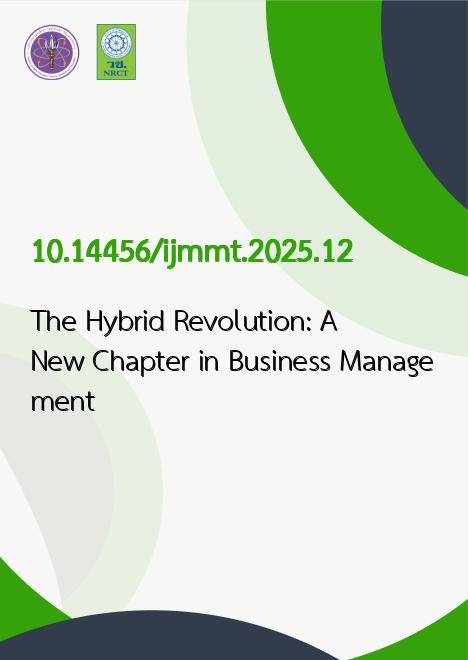
|
The Hybrid Revolution: A New Chapter in Business Management |
|---|---|
| รหัสดีโอไอ | |
| Creator | Phanutat Sawadthaworn |
| Title | The Hybrid Revolution: A New Chapter in Business Management |
| Contributor | Thanyachanok Pawala, Sanya Kenaphoom, Paripon Jumroenpat, Somboon Kaewlamai |
| Publisher | Banndamnoen Press |
| Publication Year | 2568 |
| Journal Title | International Journal of Multidisciplinary in Management and Tourism |
| Journal Vol. | 9 |
| Journal No. | 1 |
| Page no. | 67-86 |
| Keyword | Hybrid Revolution, New Chapter, Business Management |
| URL Website | https://so03.tci-thaijo.org/index.php/ijmmt |
| Website title | https://so03.tci-thaijo.org/index.php/ijmmt |
| ISSN | 2730-3306 |
| Abstract | The COVID-19 pandemic sped up the transition from traditional office-based work to remote and hybrid models, causing a major change in organizational behavior. Originally employed as emergency fixes, hybrid work models, which blend in-office and remote arrangements, have subsequently revolutionized how companies handle strategic operations, employee engagement, leadership, and resource allocation. This study aims to investigate the development and institutionalization of hybrid work forms in the twenty-first century. Its main goal is to understand how these models affect corporate management frameworks, with a focus on leadership adaptability, human capital growth, and digital transformation. The study carefully examines academic literature, industry reports, and corporate case studies published between 2019 and 2024 using a documentary research approach. Publications from Gartner, McKinsey & Company, Harvard Business Review, and peer-reviewed journals are important sources. To identify important patterns, best practices, and difficulties associated with hybrid work, thematic analysis was used. The results show that hybrid work has a big impact on organizational dynamics. Successful hybrid tactics are demonstrated by businesses like Microsoft, Google, and Salesforce, which place a strong emphasis on employee autonomy, digital tools, inclusive leadership, and flexibility. But problems like digital exhaustion, infrastructural disparity, and proximity bias still exist. AI integration, redesigned workspaces, international talent strategies, and the need for hybrid leadership abilities are some of the emerging themes. In conclusion, Hybrid labor is a paradigm shift in business management, not just a short-term adjustment. Organizations need to make investments in digital infrastructures, egalitarian policies, compassionate leadership, and ongoing learning if they want to succeed in the long run. Businesses that put an emphasis on creativity, adaptability, and diversity stand a better chance of prospering in this changing workplace environment, which is redefining the connection between people, technology, and work |